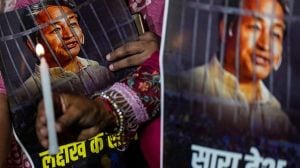Gandhi or the West?
Arthur koestler, in his highly critical essay, `Gandhi, a revaluation' published in the Sunday Times, London, on October 5, 1969, had obs...

Arthur koestler, in his highly critical essay, `Gandhi, a revaluation’ published in the Sunday Times, London, on October 5, 1969, had observed: “When all is said, the Mahatma, in his humble and heroic ways, was the greatest living anachronism of the twentieth century.” He picked holes in most of Gandhi’s ideas and ideals and pointed out their paradoxes. But as we look at the world at the close of this century we find that it is Western civilisation that has caused the worst paradoxes and perplexities and has itself become “the greatest living anachronism of the century”.
Maybe the present-day world, over which the Western civilisation dominates, is scientifically and technologically highly advanced but is it not socially and morally retarded? Maybe it has acquired phenomenal knowledge in most spheres of human affairs but is it not spiritually bankrupt?
The present situation raises a host of questions. Why, even after World War II and the establishment of the UN, have more than 20 million people diedin conflicts? Why is a “new world disorder” replacing the Cold War era? Why, despite humanitarian declarations, do the rich industrialised countries continue to create a more unfair, unjust and unequal world, and why are millions still being starved, tortured, humiliated, abused or hurt in one form or another? Why have UN institutions, set up with hope and faith, failed to attain their objectives?
“Since wars begin in the minds of men, it is in the minds that defences of peace must be constructed”. It was with this objective that UNESCO was set up in 1946. Esther Brunner, head of the US official delegation to the preparatory commission, explained: “The moving spirit behind UNESCO is the determination of people throughout the world to establish truth as a guide to public action.” But after more than five decades of UNESCO’s existence the position, in essence, remains the same. The “minds of men” show the same propensity to be aggressive as before. And truth is being butchered as cynically as in theprevious era. The only real change is in the areas of “war”, techniques of domination and the manner of resorting to untruth.
The people’s “determination to establish truth”, about which Brunner spoke so eloquently in 1946, now appears to be a joke. With all the facilities of the modern media, the powerful elements, both at the national and international levels, are able to condition even man’s mind and make him think or do what they want him to think or do. It is the propaganda of the vested interests, and not the truth, that has established its sway.
Gandhi, on the other hand, raised truth to the level of absolute faith – a religion in itself. He said: “I am led to my religion through truth and non-violence. I often describe my religion as religion of truth. Of late, instead of saying God is Truth, I have been saying Truth is God. We are all sparks of Truth… To be true to such religion, one has to lose oneself in continuous and continuing service in life.”
By sidetracking these ideals of truthand service, the West has continued with its old attitudes and kept the world under the sway of incipient barbarism. As brought out by the Human Development Report (1998), inequalities in consumption have increased to such an extent that “20 per cent of the world’s in the highest-income countries account for 86 per cent of the total private consumption expenditures the poorest 20 per cent a minuscule 1.3 per cent”. The inhuman aspect of these disparities finds telling expression in Rene Dumount’s observation: “The rich white man, with his overconsumption, behaves like a veritable cannibal; he eats the poor people of the poor countries”.
Ironically, even in the rich countries, affluence has not enlarged the scope of individual happiness or brought about greater balance and harmony in society. On the other hand, it has dehumanised individuals and made them selfish and mechanical in pursuit of personal pleasures. Family life is disintegrating. In some countries, children born out of wedlock outnumberthose born in it. In the USA alone, there are, on an average, 1,50,000 cases of rape every year, and expenditure on the consumption of narcotics exceeded the combined GDP of 80 developing countries. More than 100 million in the developed countries are homeless. At least 37 million are without jobs. In short, “God of the industrialised world” and its ideal of perpetual growth and unbridled consumption, too, have failed.
The vision and hopes entertained by agencies like UNESCO have not materialised, and human conditions, when evaluated in terms of human happiness, have not improved either in the industrialised rich countries or in the Third World.
The present-day contradictions and inequities of the type indicated above have arisen because the 20th century did not accept the ethicscape offered to it by Gandhi whom Louis Fischer called “a unique person, a great person, perhaps the greatest figure of the last 1900 years.”
By not following Gandhi’s interpretation of religion and by de-spiritualisingpolitics, the present-day world is merely adding to its sickness and reinforcing its hidden inhumanities. Unfortunately, it is ignoring Gandhi’s warning that “politics bereft of principles are death traps; they kill the soul of a nation.” Gandhi’s ideal of non-violence had a deeper significance. It involved a continuous effort to curb fear, greed, anger and other evils that lurk inside man.
Gandhi foresaw also the present environmental crisis. He understood that at the root of the environmental problems lay the culture of consumerism and acquisitiveness. He rightly pointed out that “nature had enough for everybody’s greed’. It is, therefore, not surprising that the present day world has been caught in the web woven by itself and its one part is facing degradation and degeneration on account of the problem of plenty and the other part on account of problems of paucity.
If the prevailing spiritual atrophy has to be removed and the world made safe for justice, truth and human happiness, a new mindscape,rooted in Gandhi’s ideals, has to be created, and all those, like Arthur Koestler, who considered him as the greatest living anachronism of the twentieth century consigned only to a decent place on the library-shelfs.
The writer is an MP and former governor of J&K





- 01
- 02
- 03
- 04
- 05


























